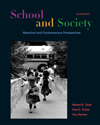 |  School and Society: Historical and Contemporary Perspectives, 4/e Stephen E. Tozer,
The University of Illinois, Chicago
Paul C. Violas
Guy Senese,
Northern Arizona University
Diversity and Equity Today: Meeting the Challenge
Professional Vocabulary- antiracist education
- An educational approach preferred by some people to multicultural education because it emphasizes the importance of combating racist ideology through educational processes.
- Black English Vernacular
- Linguists' term for the grammatical and phonemic variant of English used today in many African-American communities; its origins lie in slaves' success in developing a common language from an amalgam of different African languages and English.
- cultural deficit theory
- Explanations that find that the cultural backgrounds of different ethnic groups are the source of low-income and minority children's relatively weaker academic performance in schools.
- culturally relevant pedagogy
- See culturally responsive pedagogy.
- culturally responsive pedagogy
- Approaches to and methods of teaching that seek to respond to and incorporate the cultural knowledge of students, with an eye toward building new learning on respect for what students already know from their own cultural experiences.
- cultural subordination theory
- An explanation for the learning gap between the haves and have-nots that emphasizes that the primary thing the haves possess is the power to reward their cultural knowledge, skills, and styles through institutions that favor those factors over other forms of cultural capital.
- democratic pluralism
- Related to cultural pluralism; values cultural differences and seeks to preserve them in processes of self-governance.
- ESL instruction
- Techniques of teaching English as a second language; differs from bilingual instruction in that little or no effort in made to teach in the student's native language; often used when speakers of several languages are instructed at the same time in English.
- ethnic diversity
- A condition in which people from two or more different cultural backgrounds share a common social or institutional space.
- gender sensitivity versus gender bias
- A distinction based on the difference between awareness of when differences in gender may contribute to differences in how life and learning are experienced and the assumption that characteristics in individuals are based on their membership in a sex group.
- genetic deficit theory
- The view that differences in group achievement among different ethnic group can be explained by a different genetic endowment of intelligence in those groups.
- Head Start project
- A federal government-funded program that started in the Great Society years of the early 1960s; supported preschool education for low-income children.
- multicultural education
- An educational reform initiative to improve learning for all children by emphasizing the cultural contexts of learning and helping schools respond better to children of different ethnic backgrounds by using those differences as a foundation on which to build new learning.
- pedagogy
- Approaches to and methods of teaching.
- Plato's myth of the metals
- The "noble lie" or "necessary fiction" that people are born with gold, silver, or bronze in their systems and thus are destined to be in one of the three levels of society: at the apex, in the second leadership tier, or among the broad masses.
|
|



 2002 McGraw-Hill Higher Education
2002 McGraw-Hill Higher Education